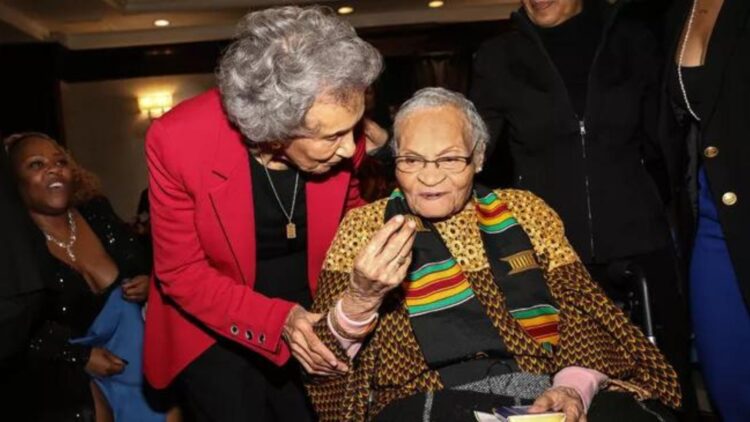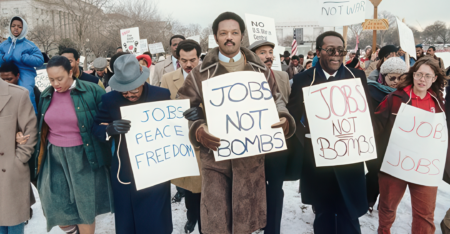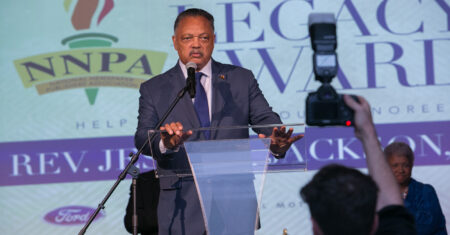By Stacy M. Brown
Black Press USA Senior National Correspondent
Mother Viola Fletcher, who carried the memory of Tulsa’s shame and the nation’s unfinished business longer than any other living soul, died on November 24 at age 111. She stood as the oldest known survivor of the 1921 Tulsa Race Massacre, the burning of Greenwood, and the attempted erasure of Black prosperity that white mobs tried to silence forever. Tulsa Mayor Monroe Nichols said her death marks a moment of mourning for a city still learning how to reckon with its own truth. “Today, our city mourns the loss of Mother Viola Fletcher, a survivor of one of the darkest chapters in our city’s history,” Nichols stated. “Mother Fletcher endured more than anyone should, yet she spent her life lighting a path forward with purpose.”
She spent that long life fighting for justice that too many leaders tried to bury along with the bodies from Black Wall Street. In Greenwood, she was a child watching terror reshape a world that had promised her nothing but possibility. For more than a century, she bore witness so the country could never again pretend not to know. “Her legacy will be carried forward with the courage and conviction she modeled every day of her life,” Nichols said.
Mother Fletcher’s mission reached the halls of Congress when she demanded reparations for survivors and descendants of the massacre. She testified with a steadiness that shamed a nation still unwilling to repair what it helped set ablaze. She reminded lawmakers she had lived through state-sponsored violence and had lived long enough to see the excuses that followed. She co-authored her memoir “Don’t Let Them Bury My Story” with her grandson, refusing to allow America the comfort of forgetting.
She left her words in the archives of Oklahoma State University through oral histories that insisted history would not escape the sound of her voice. Her labor began early. During World War II, she worked in a shipyard as an assistant welder. Later, she cleaned houses with a determination that carried her well into her eighties. She built a life out of the ashes she was never meant to rise from.
The world took notice of her strength. During a 2021 journey to Ghana, she received the title “NaaLamiley,” translated as someone strong enough to stand the test of time. Her vision inspired the Viola Ford Fletcher Foundation, which promotes education, health, and economic opportunity. Community members honored her in ways large and small, including the gift of custom dentures created to recognize her legacy and impact.
Three years ago, she stood with her brother, Hughes Van Ellis, known as Uncle Red, inside Ghana’s embassy in Washington. She was 108 then. He was 101. Both were sworn in as citizens of Ghana in a ceremony filled with music, dancing children, and the full weight of ancestral return. It was the first time anyone had been sworn in as a citizen inside the Ghanaian embassy. “I’m so grateful to all. I thank you so much for this honor,” Fletcher said before signing her citizenship papers. Her brother echoed her sentiment. “I’m so thankful to Ghana, and all of you,” Ellis stated.
Oklahoma State Rep. Regina Goodwin attended the ceremony, along with journalist Tiffany Cross and Ambassador Erieka Bennett. Bennett spoke of heritage that surpasses borders. “You don’t have to be born in Africa to be an African,” Bennett declared. “Africa is born in you.”
Cross spoke of feeling the presence of ancestors moving through the room, a presence made sharper by the endurance of Fletcher and Ellis. Goodwin said their lives proved that the African spirit cannot be broken. “This is what it’s all about,” Cross stated. “The spirit of Africa, its powerful and rich history.”
Their citizenship ceremony became more than a celebration. It became a reminder that the diaspora carries stories the world still needs to hear, and that the road home is long but never closed. Bennett told the gathering that Ghana opens its doors to all who seek connection. “Welcome home,” she said.







